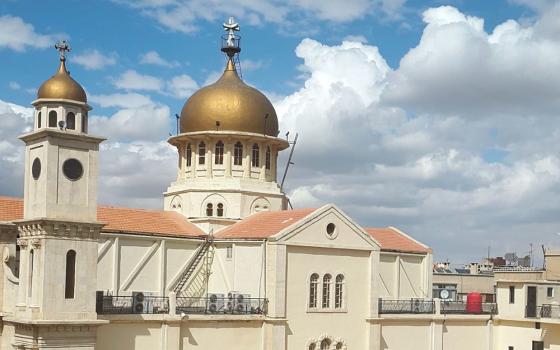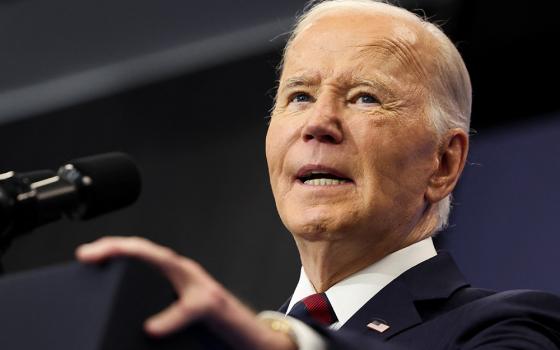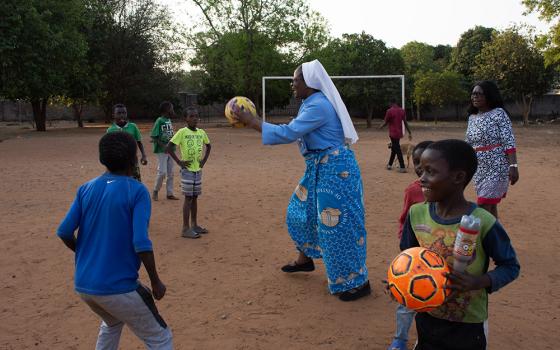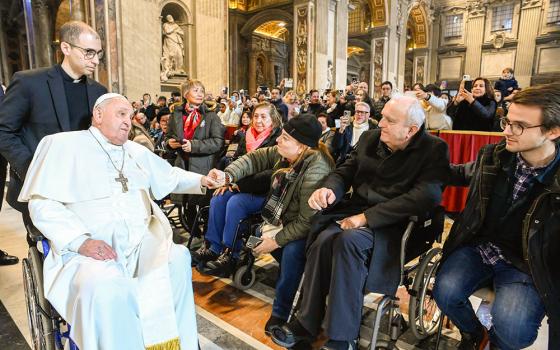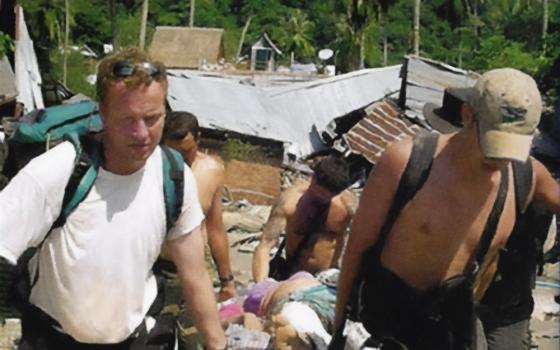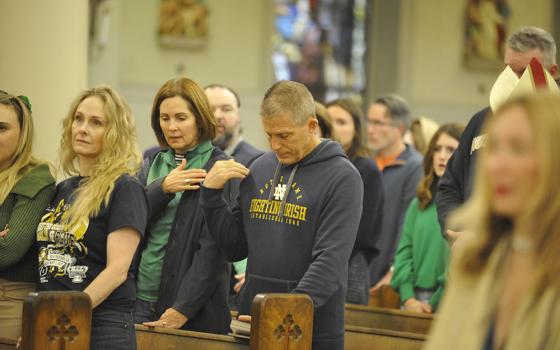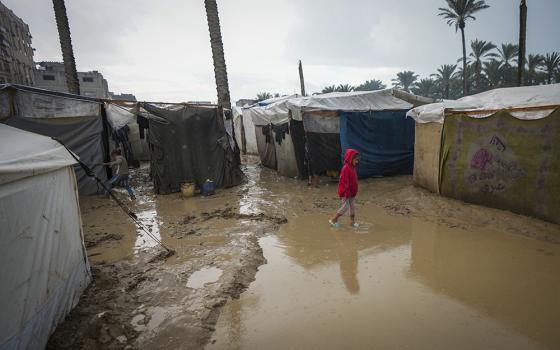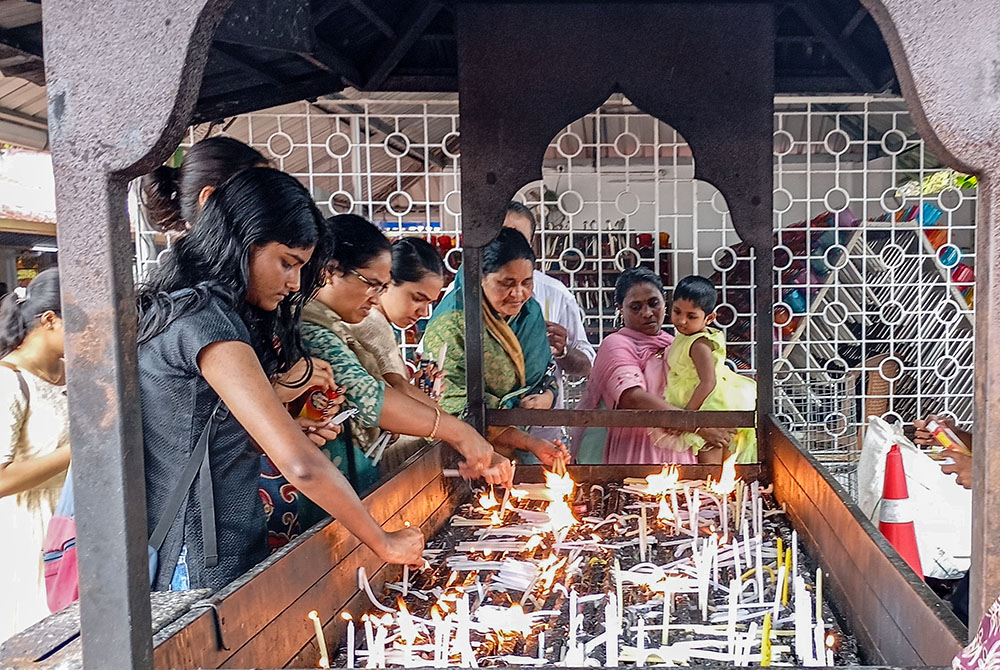
Devotees light candles at the St. Alphonsa Pilgrim Centre in Bharananganam in the Palai Diocese, southwestern India. (Thomas Scaria)
More than 300 nuns from 12 congregations are on a faith renewal mission among Catholic families to help a southwestern Indian diocese celebrate its platinum jubilee.
Catholics of the Palai Diocese say the nuns' "home mission" has deeply impacted their lives.
"The nuns completed visiting around 50,000 Catholic families in more than 100 parishes in the past four months," Franciscan Clarist Sr. Jossy Kallarangatt told Global Sisters Report on July 26.
The home mission, she said, has not only helped family renewals in each parish but "strengthened our spirituality and vocation." Kallarangatt led around 80 members of her congregation in the mission.
Family renewal is a major program for the diocese, which launched its yearlong platinum jubilee celebrations on July 26 at the tomb of St. Alphonsa of the Immaculate Conception, who was the first woman saint of India.
The diocese, created on July 25, 1950, has 171 parishes with 334,668 Catholics in 68,388 families.
Bishop Joseph Kallarangatt of Palai, Sr. Jossy Kallarangatt's relative, applauded the nuns for undertaking the "much-needed home mission" when the diocese focused on renewing its "rich cultural and religious heritage" at the time of its jubilee.
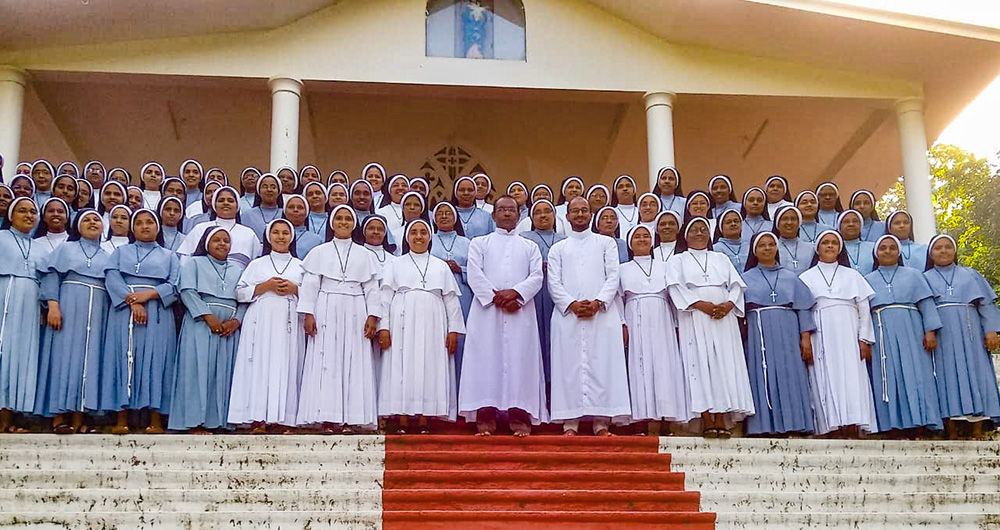
Around 80 Franciscan Clarist Sisters carried out a faith renewal mission in Sacred Heart Parish in Peringulam, India, by spending more than one hour of prayer and interaction with families. (Courtesy of Jossy Kallarangatt)
The bishop said the diocese has provided the most priests, nuns and missionaries to the church in India.
The nun said that many Catholic homes received the nuns as "their own family members," sharing their faith life, struggles, problems and complaints.
She said the last parish her team visited was Sacred Heart Church, Peringulam, trekking hilly, difficult terrains, rivers and streams in the rainy season.
In each family, the nuns begin their program with an opening prayer and Bible reading, followed by a discussion on sacramental life with family members, and ending with a family prayer.
Mother of Carmel Sr. Pavithra Puthenpurackal told GSR that her congregation completed visits to 14 parishes by the end of July.
"It was a rich experience, although challenging, as we accompanied families in their spiritual journey," the nun in her late 50s explained.
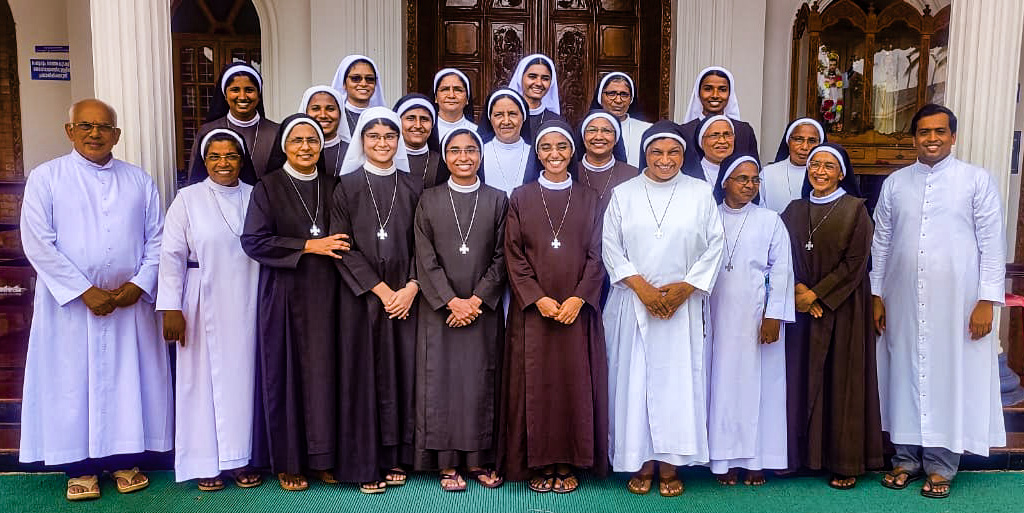
Mother of Carmel nuns with Sr. Pavithra Puthenpurackal (front row, fourth from right) and the priests of St. Xavier's Church in Mannarapara, in the Palai Diocese, southwestern India. (Courtesy of Jossy Kallarangatt)
Although each parish has one or more convents belonging to different congregations, nuns from those convents are not involved in the home mission in the same parish.
"This is to maintain confidentiality and objectivity so that people can feel comfortable sharing," said Puthenpurackal, retired principal of a teacher training college in Palai.
While the Franciscan Clarist nuns travel in large numbers to cover a parish within a day or two, the Carmelite nuns go in small groups and stay in the parish until every family is covered.
The nuns assemble in the parish church in the morning for prayers with the parish priest and leaders of the parish units before visiting houses. The home mission ends with a prayer and evaluation at the parish church.
The ward leader accompanies the nuns to the first house in his unit. "Once we complete the mission in one house, the head of the family accompanies us to the next home," Puthenpurackal explained.
Advertisement
"These visits have revealed the reality of the Christian homes such as their socioeconomic and spiritual life, relations within the family and neighborhood, marital status and discords," said Puthenpurackal, her congregation's home mission coordinator.
She said her team has noticed that the modern lifestyle has considerably affected Christian practices in many families. She, however, appreciated the practice of evening prayer with them, although they adjusted the timing to suit TV shows and other programs.
"In many homes, we could see only aged parents as their children have migrated to other countries for studies or live separately. Some homes were empty, and in some cases, only single parents or widows lived there," she said.
The nuns spend one hour with each family, and a team consisting of two nuns visits a maximum of seven homes in a day.
"We could reunite many with the church and sacraments," Puthenpurackal said.
Sacred Heart Sr. Rosmin Cheruvil, who coordinated her congregation's 30-member home mission, said the program has also helped them experience divine intervention as they covered 27 parishes until the end of July.
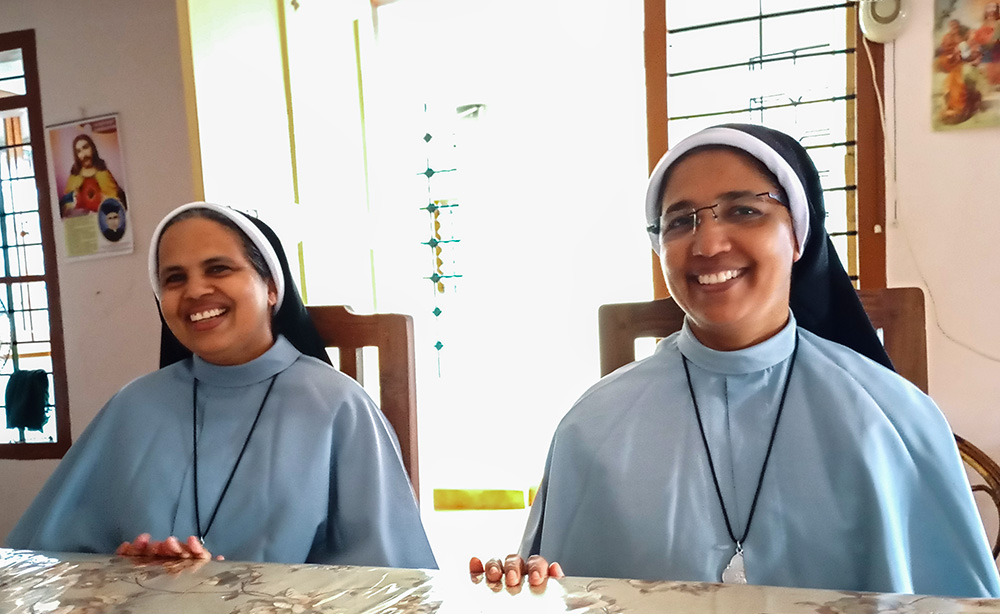
Sacred Heart Srs. Rosmin Cheruvil (right) and Merlin Areeparambil. The sisters of the Sacred Heart Congregation covered 27 parishes as part of their home mission in the Palai Diocese in southwestern India. (Thomas Scaria)
"To be with the people is central to our vocation, but we hardly reach out to people in their homes because of our institutions and professional engagement," she added.
The nuns were accommodated in the parish, local convents or unoccupied houses.
"The program was like a camp experience with the parish community," Cheruvil said. The parishioners prepared breakfast and dinner for the nuns. Some families served them lunch, too.
Cheruvil's team observed Catholics attending Sunday Mass without fail, but some of them also had issues such as alcoholism, drug use, mobile addictions and relationship problems.
They found that several parents worried about their children's lifestyles but still supported them in studying overseas or migrating to other countries for jobs.
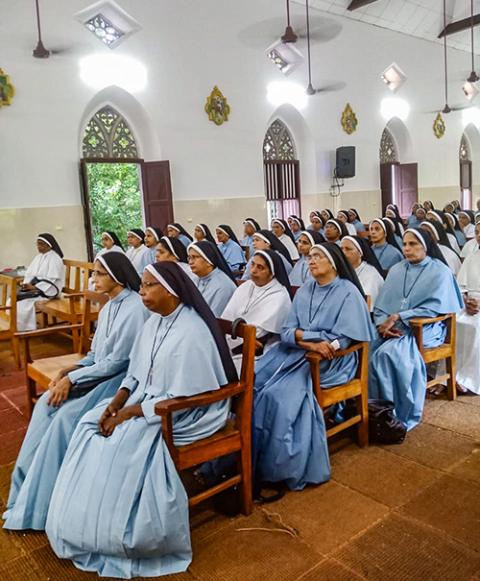
Franciscan Clarist Sisters attend a home mission orientation program in Sacred Heart Church in Peringulam, India. (Courtesy of Jossy Kallarangatt)
Some parents asked the church to build homes for the elderly and provide care as there is a great need.
Cheruvil, a council member in her congregation, was also concerned about dwindling vocations. "The home missions did not give us hope of getting new vocations, although we expected to meet some prospective candidates."
Her congregation has more than 4,000 members in 11 provinces with an average age of 60.
Not all families welcomed the nuns. Some families even refused to receive them. "We never felt bad, as we were trained to accept such rejections," Cheruvil said.
The diocese had asked the Congregation of the Holy Family, which has a home apostolate as its mission, to train nuns from other congregations for the program.
"We conducted two three-day training camps in April to prepare them with basic principles of spiritual and psychological counseling," said Holy Family Sr. Delsy Poruthur, who said the nuns train to be patient and empathetic when listening to the family members. Another task of the nuns was to bring family members closer to the sacraments.
"We may not be able to solve all their problems, but we can create an atmosphere of confidential sharing that will eventually heal many of their problems," she asserted.
Franciscan Clarist Sr. Deepa Poriyathu, who served at the St. Alphonsa Pilgrim Centre during the feast days in the last week of July, observed a greater flow of pilgrims from the parishes the home mission covered.
"The sisters have accompanied them in their struggles and pains," she told GSR.
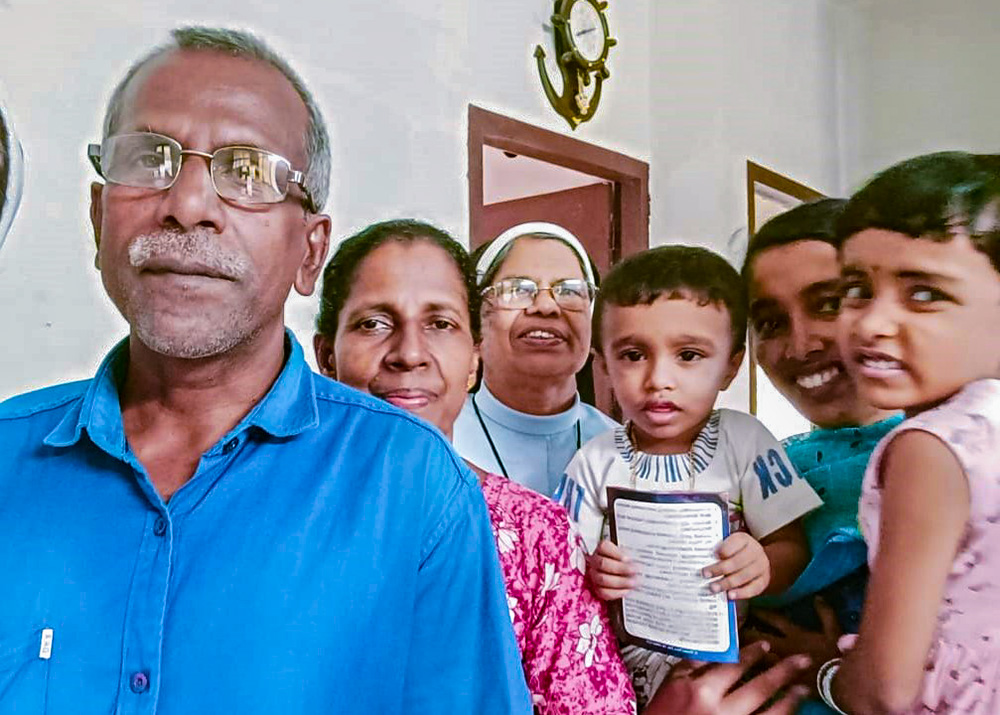
A Sacred Heart nun with one of the 50,000 families visited under the home mission faith renewal program of the Palai Diocese, southwestern India (Courtesy of Rosmin Cheruvil)
Fr. Jose Tharappel, the parish priest of Little Flower Church, Piravom, told GSR that the home mission nuns have given "a visible spiritual boost" to his 520 families.
The priest also noticed more people attending daily Mass. "Neighborhood relations have improved, and many have received the sacrament of confession and holy Communion after the nuns left the parish," he added.
Several Catholics told GSR that the nuns have had a meaningful impact on their lives.
Philomina Joseph, a member of Fathima Matha Church, Chettuthodu, said the nuns' visit was "a pleasant experience of sharing and prayer."
"All my family were present when the sisters visited us," said the 55-year-old woman who visited St. Alphonsa Pilgrim Centre on July 26 with her 23-year-old son. She wants the nuns' program to continue yearly as it "links us closer to the church."
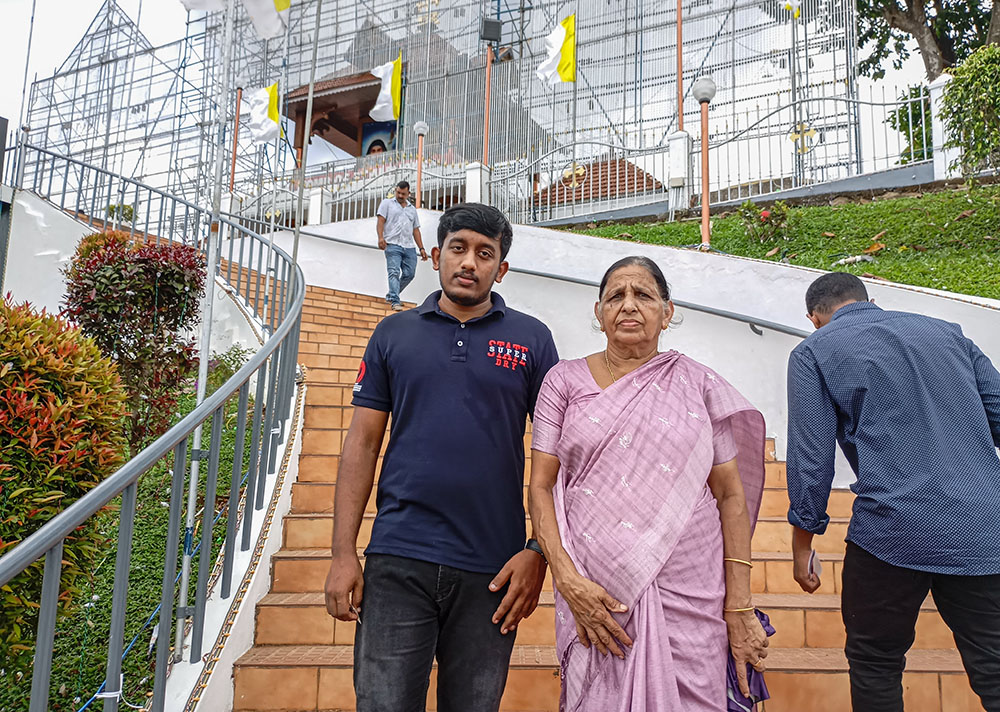
Philomina Joseph, a member of Fathima Matha Church in Chettuthodu, visits St. Alphonsa Pilgrim Centre, Bharanganam, near Palai, southwestern India, after the nuns visited her for the home mission. (Thomas Scaria)
Sona Jaison, a nurse in Poonjar, said the Daughters of St. Thomas nuns spent more than an hour with her family in "healthy interactions and prayers."
Joby Kootungal and his twin brother, Joshy, who run a car garage in Antheenadu, said they closed shop early and waited for the nuns at home. "We were educated by the nuns, and we have great respect for them," said Joby.
Joshy said hosting the nuns at home was truly a "spiritual experience."
Anjo Nedumparayil, an 18-year-old altar boy of the Sacred Heart Church, Peringulam, said more than 80 sisters visited homes in his parish and gave them a spiritual retreat experience.
Fr. Joseph Thadathil, the diocese's vicar general who coordinated the program, told GSR that it was to give the faithful "patient listening" and guide their spiritual renewal during the jubilee year.
"We started with the families, but will continue the renewal process with parents, children, youth, migrants, religious and students," he added.

